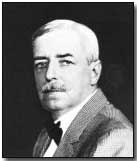Who's Who - Robert Lansing
 Robert Lansing (1864-1928)
served as US Secretary of State from 1915-20 in President
Woodrow Wilson's
administration, replacing
William Jennings Bryan who resigned in protest at Wilson's allegedly
hawkish approach to US neutrality in 1915.
Robert Lansing (1864-1928)
served as US Secretary of State from 1915-20 in President
Woodrow Wilson's
administration, replacing
William Jennings Bryan who resigned in protest at Wilson's allegedly
hawkish approach to US neutrality in 1915.
Lansing was born on 17 October 1864 in Watertown, New York. Trained as an international lawyer (and having started a legal practice in Watertown in 1889), he was appointed associate counsel in the Bering Sea arbitration in 1892-93, and thereafter frequently acted as federal counsel at international tribunals.
Appointed counsellor to the US State Department by President Wilson in April 1914, Lansing became Secretary of State following Bryan's decision to resign in June 1915 over what he believed to be Wilson's overly aggressive stance to the German sinking of the Lusitania.
Despite Lansing's powerful new role, Wilson himself chose to determine all major foreign policy decisions, working in tandem with his close advisor 'Colonel' Edward House, whom he invariably despatched to Europe to liaise directly with European governments.
Nevertheless, Lansing did emphasise to the major belligerent nations - the U.S. being at that stage officially neutral - the importance of upholding the rights of U.S. vessels at sea. In particular he strenuously objected to Britain's blockade of shipping, which notably impacted U.S. trade.
Lansing was also instrumental in persuading Denmark to sell to the U.S. its islands in the West Indies; renamed the U.S. Virgin Islands, Lansing believed U.S. control of these to be important in preventing their falling under German influence.
He was further successful in securing Wilson's initially sceptical agreement to the provision of substantial bank loans to the Allied powers from October 1915 onwards. Increasingly, Lansing viewed an Allied victory as necessary for the defence of civilised values in addition to viewing Germany as a threat to U.S. interests.
Once the U.S. had formally entered the war, Lansing negotiated with the Japanese government the Lansing-Ishii agreement in 1917, in which the U.S. recognised Japan's interests in China, securing in return Japanese acceptance of equal trading rights for all nations there.
Lansing's working relationship with Wilson plummeted towards the close of the war in 1918, as Wilson rejected Lansing's advice not to personally attend the Paris Peace Conference. Once at Paris Wilson chose to undertake most of the major policy decisions himself, seldom referring to Lansing.
Lansing held notable reservations about Wilson's enthusiasm for the League of Nations. He argued that securing ratification of the peace treaty was more pressing and that the case for the League could be made later; Wilson disagreed, irritated earlier at Lansing's reservations concerning his cherished Fourteen Points (which Lansing regarded as too vague and insufficiently pragmatic).
Lansing nevertheless lobbied Congress to accept both the treaty and the League, ultimately without success in the latter case (with the Republicans, notably Henry Cabot Lodge, energetically and effectively opposing both).
Following Wilson's illness, beginning September 1919, Lansing played a much larger role in executing foreign policy; he also conducted numerous Cabinet meetings. Wilson, feeling that Lansing was acting with undue independence, requested and received Lansing's resignation in February 1920.
Lansing, one of the founders of the American Society of International Law, published numerous books, including works on international law and on the Versailles treaty. He died on 30 October 1928 in New York at the age of 64.
Click here to read Lansing's letter regarding the so-called 'Dumba Affair' in 1915; click here to read Lansing's position on the subject of shipment of U.S. munitions to Britain; click here to read Lansing on the subject of Pancho Villa; click here to read Lansing's official statement of September 1918 recognising Tomas Masaryk as the prospective head of a post-war Czech state; click here to read Lansing's official statement recognising Paderewski's Polish government.
A Flechette was an anti-personnel dart dropped from an aircraft.
- Did you know?
